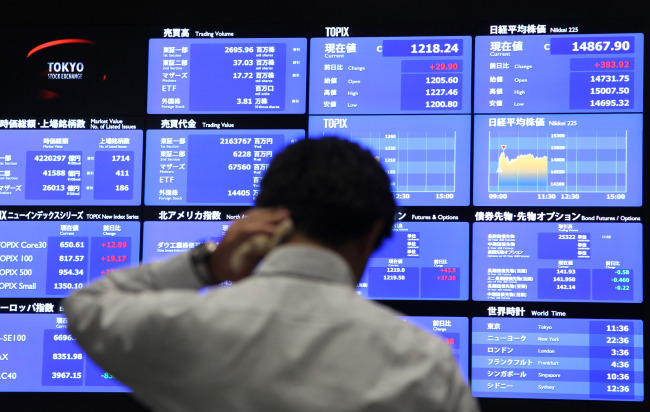Bank of Japan Governor Haruhiko Kuroda backed “bullish” views on asset markets and said the nation could cope with rising interest rates, failing to ease volatility in stocks as the Topix Index tumbled.
There are no signs investors have “excessively bullish expectations,” the 68-year-old Kuroda said in Tokyo Sunday. He cited an April BOJ report indicating rates could rise by between one and three percentage points in an improving economy without causing financial instability.
Adding to Kuroda’s communication challenges, Monday’s minutes of a BOJ meeting on April 26 showed divisions on the policy board, where “a few” members see difficulties meeting a 2 percent price goal by the end of March 2016. One member said the bond market could become unstable again, while others said that swings in financial markets had been triggered by perceptions that the BOJ had conflicting goals ― trying to push down interest rates while pursuing inflation.
 |
A visitor looks at an electronic stock board at the Tokyo Stock Exchange in Tokyo on Friday. (Bloomberg) |
“Kuroda should have explained why the market is volatile now and why he thinks it’s going to be ok, rather than just saying he doesn’t see any major problem,” said Kazuhiko Ogata, chief Japan economist at Credit Agricole SA. in Tokyo. “Kuroda hasn’t yet learned how to communicate well with the market.”
The Topix slid 3.4 percent Monday, after plunging 6.9 percent on May 23. Monday, it was still up 34 percent for the year.
The Nikkei 225 Stock Average lost 3.2 percent Monday. The yen climbed 0.3 percent to trade at 101.00 against the dollar at 3:14 p.m. in Tokyo. Ten-year government bonds yielded 0.830 percent after touching 1 percent last week, more than triple a record low on April 5.
Kuroda was speaking to the Japan Society of Monetary Economics at Hitotsubashi University, where he was once a professor, two months after taking over as BOJ governor with a pledge to do whatever it takes to defeat deflation. On April 4, he unveiled a plan to double money in the economy over two years by ramping up bond purchases, chasing a target of 2 percent inflation.
There’s “no sign at this point of excessively bullish expectations in asset markets or in the activities of financial institutions,” Kuroda said. He also restated that, while central bank asset purchases are intended to drag yields down, the reverse may happen in an improving economy.
“Corrections in the stock market so far are positive as stocks have gained too rapidly.” said Credit Agricole’s Ogata.
(Bloomberg)




![[Weekender] Korea's traditional sauce culture gains global recognition](http://res.heraldm.com/phpwas/restmb_idxmake.php?idx=644&simg=/content/image/2024/11/21/20241121050153_0.jpg)



